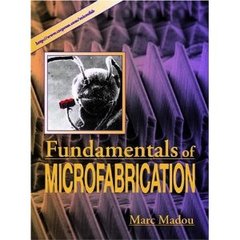
Fundamentals of Microfabrication: The Science of Miniaturization, 2nd. ed.
Marc J. Madou
(2002) 608 pages
A bestseller in its first edition, Fundamentals of Microfabrication, Second Edition: reflects the many developments in methods, materials, and applications that have emerged recently. Renowned author Marc Madou has added exercise sets to each chapter, thus answering the need for a textbook in this field.
Fundamentals of Microfabrication, Second Edition: offers unique, in-depth coverage of the science of miniaturization, its methods, and materials. From the fundamentals of lithography through bonding and packaging to quantum structures and molecular engineering, it provides the background, tools, and directions you need to confidently choose fabrication methods and materials for a particular miniaturization problem.
New in the Second Edition:: Revised chapters that reflect the many recent advances in the field
; Updated and enhanced discussions of topics including DNA arrays, microfluidics, micromolding techniques, and nanotechnology
; In-depth coverage of bio-MEMs, RF-MEMs, high-temperature, and optical MEMs.
; Many more links to the Web
; Problem sets in each chapter
Features:: Offers the most comprehensive introduction to the science of miniaturization; Includes well-chosen examples and hundreds of illustrations, many in full color
; Provides extensive lists of references, Web links, and suggestions for further reading; Reviews both top-down and bottom-up manufacturing methods
; Bridges the gap between "wet" and "dry" microengineering
; Details an abundance of industrial and medical MEMS applications, from the historical to the state-of-the-art
Contents
LITHOGRAPHY
Introduction
Historical Note
Lithography's Origins
Photolithography Overview
Critical Dimension, Overall Resolution, Line-Width
Lithographic Sensitivity and Intrinsic Resist Sensitivity (Photochemical Quantum Efficiency)
Resist Profiles
Contrast and Experimental Determination of Lithographic Sensitivity
Resolution in Photolithography
Photolithography Resolution Enhancement Technology
Beyond Moore's Law
Next Generation Lithographies
Emerging Lithography Technologies
PATTERN TRANSFER WITH DRY ETCHING TECHNIQUES
Introduction
Dry Etching
Definitions and Jargon
Plasmas or Discharges
Physical Etching
Ion Etching or Sputtering and Ion-Beam Milling
Plasma Etching (Radical Etching)
Physical/Chemical Etching
PATTERN TRANSFER WITH ADDITIVE TECHNIQUES
Introduction
Silicon Growth
Doping of Si
Oxidation of Silicon
Physical Vapor Deposition
Chemical Vapor Deposition
Silk-Screening or Screen-Printing
Sol-Gel Deposition Technique
Doctors' Blade or Tape Casting
Plasma Spraying
Deposition and Arraying Methods of Organic Layers in BIOMEMS
Thin versus Thick Film Deposition
Selection Criteria for Deposition Method
WET BULK MICROMACHINING
Introduction
Historical Note
Silicon Crystallography
Silicon As Substrate
Silicon As A Mechanical Element In MEMS
Wet Isotropic And Anisotropic Etching
Alignment Patterns
Chemical Etching Models
Etching With Bias And/Or Illumination Of The Semiconductor
Etch-Stop Techniques
Problems With Wet Bulk Micromachining
SURFACE MICROMACHINING
Introduction
Historical Note
Mechanical Properties of Thin Films
Surface Micromachining Processes
Poly-Si Surface Micromachining Modifications
Non-Poly-Si Surface Micromachining Modifications
Materials Case Studies
LIGA AND MICROMOLDING
Introduction
LIGA-Background
LIGA and LIGA-Like Process Steps
A COMPARISON OF MINIATURIZATION TECHNIQUES
TOP-DOWN AND BOTTOM-UP MANUFACTURING
Introduction
Absolute and Relative Tolerance in Manufacturing
Historical Note
Human Manufacturing
Section I
Top-Down Manufacturing Methods
Section II
Bottom-Up Approaches
MODELING, BRAINS, PACKAGING, SAMPLE PREPARATION AND NEW MEMS MATERIALS
Introduction
Modeling
Brains In Miniaturization
Packaging
Substrate Choice
SCALING, ACTUATORS, AND POWER IN MINIATURIZED SYSTEMS
Introduction
Scaling
Actuators
Fluidics
Scaling In Analytical Separation Equipment
Other Actuators
Integrated Power
MINIATURIZATION APPLICATIONS
Introduction
Definitions and Classification Method
Decision Three
OVERALL MARKET For MICROMACHINES
Introduction
Why Use Miniaturization Technology ?
From Perception to Realization
Overall MEMS Market Size
MEMS Market Character
MEMS Based on Si
Non-Silicon MEMS
MEMS versus Traditional Precision Engineering
The Times are a'Changing
APPENDICES
Metrology Techniques
WWW Linkpage
Etch Rate for Si, SiO2
Summary of Top-Down Miniaturization Tools
Listing of names of 20 amino acids & their chemical formulas; Genetic code
Summary of Materials and Their Properties for Microfabrication
References for Detailed Market Information on Miniature Devices
MEMS Companies Update
Suggested Further Reading
Glossary
Symbols used in Text
INDEX
Each chapter also contains sections of examples and problems
———————————————————————————————— ————————
Contact us at info@electrostatic.com
 Electrostatic Applications
Electrostatic Applications